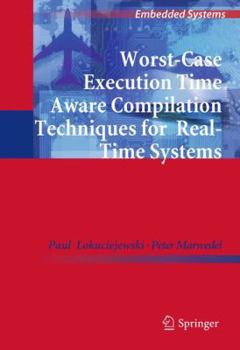Worst-Case Execution Time Aware Compilation Techniques for Real-Time Systems
Select Format
Select Condition 
Book Overview
1. Introduction. 1.1. Design of Embedded Real-Time Systems. 1.2. Contribution of this Work. 1.3. Outline.
2. WCET Analysis Techniques. 2.1. Introduction. 2.2. Approaches for WCET Analysis. 2.3. Basic Concepts for Static WCET Analysis. 2.4. Static WCET Analyzer aiT.
3. WCC - WCET-Aware C Compiler. 3.1. Introduction. 3.2. Related Work. 3.3. Structure of the WCC Compiler. 3.4. Integration of WCET Analyzer. 3.5. Modeling of Flow Facts. 3.6. Static Loop Analysis. 3.7. Back-Annotation. 3.8. TriCore Processor.
4. WCET-Aware Source Code Level Optimizations. 4.1. Introduction. 4.2. Existing Code Optimization Techniques. 4.3. Procedure Cloning. 4.4. Superblock Optimizations. 4.5. Loop Unrolling. 4.6. Accelerating Optimization by the Invariant Path. 4.7. Summary.
5. WCET-Aware Assembly Level Optimizations. 5.1. Introduction. 5.2. Existing Code Optimization Techniques. 5.3. Procedure Positioning. 5.4. Trace Scheduling. 5.5. Summary.
6. Machine Learning Techniques in Compiler Design. 6.1. Introduction. 6.2. Related Work. 6.3. Machine Learning Based Heuristic Generation. 6.4. Function Inlining. 6.5. Loop-Invariant Code Motion. 6.6. Summary.
7. Multi-Objective Optimizations. 7.1. Introduction. 7.2. Motivation. 7.3. Related Work. 7.4. Compiler Optimization Sequence Exploration. 7.5. Multi-Objective Exploration of Compiler Optimizations. 7.6. Experimental Results for Optimization Exploration. 7.7. Summary.
8. Summary and Future Work. 8.1. Research Contributions. 8.2. Future Work.
A. Abstract Interpretation.
B. Transformation of Conditions.
References. List of Figures. List of Tables. Index.





